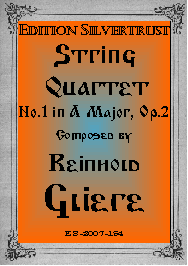Presents
Reinhold Gliere
String Quartet No.1 in A Major, Op.2
 With
his String Quartet No.1 in A Major, Op.2, Reinhold Gliere made it clear to all
that his was a world class talent.
With
his String Quartet No.1 in A Major, Op.2, Reinhold Gliere made it clear to all
that his was a world class talent.
Today, the reputation of Reinhold Gliere (sometimes spelled Glier 1875-1956) rests primarily upon his symphonies, ballets and operas, however his many chamber music works are widely regarded as of the highest quality by those who are familiar with them. Gliere was born in the then Russian city Kiev. He began his musical studies there with the famous violin teacher Otakar Sevcik, among others. He then went to the Moscow Conservatory where he studied with Sergei Taneyev, Anton Arensky and Mikhail Ippolitov-Ivanov. His superb compositional technique was quickly recognized by his teachers and he won several prizes for his early works, including his First String Sextet which took the prestigious Glinka Prize from a jury consisting of Rimsky-Korsakov, Glazunov and Liadov. Gliere, himself, taught at the Moscow and Kiev conservatories for nearly 40 years. Among his many successful students were Khachaturian, Prokofiev and Miaskovsky.
Of Gliere's chamber music, the respected scholar and critic Professor Sabaneiev wrote:
"His chamber compositions show him to have been an absolute master of form, and a virtuoso in his control of the resources of musical composition and expression...He excelled as a melodist and his themes often reveal the contours of the Russian style which he understood so well. He had a masterly knowledge of the instruments and of their resonance, hence his chamber works are astonishingly rich and well written."
The highly respected chamber music critic Wilhelm Altmann describes the work as follows:
"Gliere's First String Quartet, which was published in 1902, is a very noteworthy work that is full of rich melodies. It is tonally beautiful and plays well. The first movement, Allegro, is brimming with bold harmonies and almost has an operatic quality to it. The scherzo, Allegro, which comes next, is Russian from start to finish. The Theme and Variations, Andantino, which comprise the third movement, are not only interesting but extremely well executed, each providing superb contrast. The finale, Allegro, is also unmistakably Russian. The second theme is memorably for its dance-like quality.
This quartet,
along with his Second, rePresents
the
epitome of the Russian National School in chamber music as developed over many
long years by Rimsky Korsakov and Borodin. It is a finely-crafted work that will make
a lasting impression upon any audience which has the pleasure of hearing it,
and can be recommended to amateurs and professionals alike.
|
(A) Parts (US & Non US Addresses) |
$24.95 |
|
|
(B) Parts & Score US Addresses |
$33.95 |
|
|
(C) Parts & Score NON US Addresses |
$43.95 |